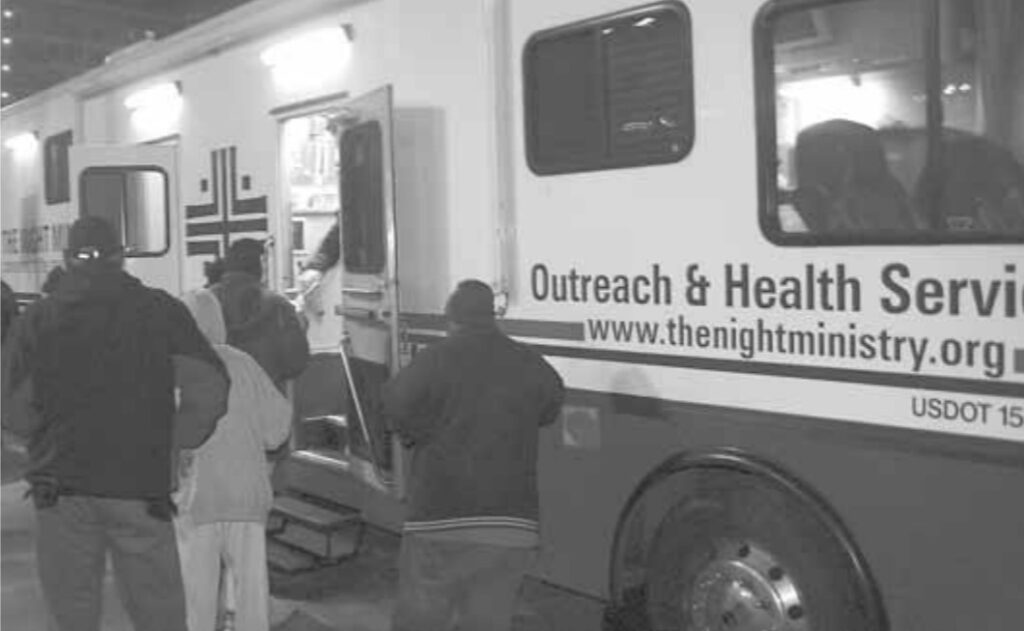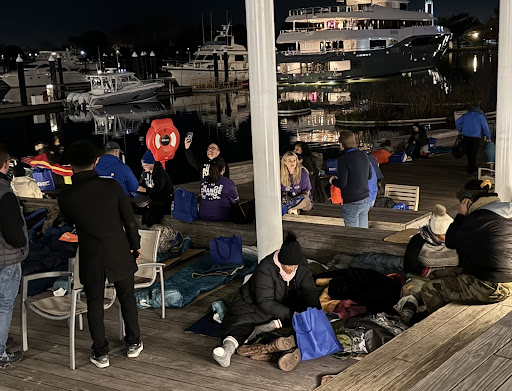The Night Ministry health outreach bus operates according to a motto not of scarcity but of abundance.
“Everybody gets something or no one does,” said Mark Bradley, director of outreach and health ministry at the nonprofit organization. “Scarcity induces more competitiveness and fear,”
This motto made for extremely congenial men and women lined up at three stops on a recent evening in Uptown, Woodlawn and South Shore, all towns in Illinois.
“Hospitality is key for us,” Bradley said. Coffee, hot chocolate, food, hygiene kits, warm clothes and condoms are given out at the 38-foot bus. The back of the bus provides an examination space for the nurse practitioner. And the front of the bus is for confidential HIV and STD testing and counseling.
The Night Ministry calls its bus “mobile relationship building.”
Around 7 p.m. at the first stop, which is in Wilson, a long line of people waited outside in the cold for the food offered by St. Anne’s Catholic Church of Barrington, Ill., as well as the medical services offered inside the bus.
The Night Ministry was founded in 1976 to help underserved people: the homeless, working poor, uninsured and mentally ill. It served 5,750 people this year and was assisted by over 400 volunteers. In addition to its health outreach bus, it provides drop-in services and shelter for homeless youth.
The Night Ministry is completely funded by donations. It’s the recent winner of the “Fueling Good” award and received $2,500 in fuel from Citgo Petroleum Corp., which will tide the bus through the winter. The award was the result of feel-good stories the Night Ministry submitted to the corporation, followed by an online vote.
Additional help comes from churches like St. Anne’s. On that recent chilly evening, seven teenage girls distributed hot, homemade soup, oranges, potato chips and a choice of homemade banana bread or a packaged, store-bought sweet roll. Once the lines dissipated, there was very little food left, and no more homemade banana bread.
Annie, one of the teenagers passing out the food, said she loves to volunteer at least once a month. She organizes her friends, some of who are returning volunteers and some of who are new, to help out.
The Night Ministry attracts an wide array of volunteers, from nurse practitioner Barbara Sexton, who’s been volunteering since 1992, to Faith Miller, a recently returned soldier from Iraq with a master’s degree in divinity.
Two students from Northwestern Medical School, which requires two or three volunteer experiences for completion of a degree, also volunteered that night. The Night Ministry is one of Northwestern’s approved programs. “You see all ages, a good mix of ethnicity and backgrounds, including Mexican, Irish and African American. It doesn’t discriminate,” said Charles Chaney, a second-year medical student. “We need service organizations that want to help people in all walks of life.”
Chaney and Luke Laing, another Northwestern med student. assisted Sexton in checking patients’ vital signs, initially assessing medical problems, and then organizing the patients into a line.
E.S., a counselor volunteer who asked that her name not be used in this article because of concerns over patient confidentiality, said she tells the people that she tests and counsels for HIV that “it’s not about me, it’s about you. I love you and care about you.”
Bradley described one woman as a “survival sex worker,” saying she normally eats out of garbage cans and supplements her income with sex acts. She has children to support.
The Night Ministry volunteers remind those they counsel to use condoms in all sexual encounters. E.S. even advises married women and tells them that, “Yes, you are married, but you do not know where he’s been.”
She said patients often tell her they don’t like to carry condoms because it makes them feel like a “cheat bug, or a prostitute.” But she tells them to “remind themselves they are worth it. Keep it in your wallet like an American Express card or a lucky dollar. It’s there when you need it.”
The front of the bus can receive results from HIV testing in 20 minutes. One volunteer counselor has seen only three HIV-positive results in seven months.
Sexton, the nurse practitioner who is at the back of the bus, treated four people with colds at the Uptown stop. She diagnoses anything from asthma to diabetes, to pneumonia to foot care, which is important to people who spend a lot of time outside.
Sexton doesn’t prescribe medicine, but she does dispense it to those in need. She then refers patients to clinics for follow-up medical care. She’s careful to tell the patients that she’s not a primary-care doctor and that they must find one at a clinic.
Outreach professional Carlos McFarlane organized the food and necessities that were distributed from the bus. He’s the one who, at the last stop at 11:30 p.m., has to tell people still waiting in line in the pouring rain that there are no more sandwiches and the hot chocolate is gone, but there’s still some coffee left if anyone wants it.
Many of the people at the bus know each other and there’s a strong sense of community among the Night Ministry’s volunteers. “This is like a Band-Aid between making it and not making it,” said Maria Tampico at the Uptown stop.
Tampico is a street musician who plays a 12-string guitar and violin simultaneously while tap dancing and whistling at a CTA Red Line stop downtown. She’s planning to have dental work in the new year so she can continue to whistle and earn a living. She received pain pills and antibiotics from the Night Ministry so her teeth don’t get infected.
A friend of hers, E.J., accompanied her to the bus that night. He said he’s not homeless and doesn’t need the food, but he comes about once a month for the medical care because he has no medical insurance.
“Barbara lets me know my blood pressure is elevated and gives me recommendations to see a physician for an appointment,” he said. “It’s a big help and it’s nice to see someone who cares.”
Another man at the bus’s Uptown stop said that the condoms, socks and skullcaps he gets save him money and keep him from “having to buy it.” A woman with him added, “Or steal it.”
A 44-year-old homeless man at the bus’s South Shore stop who fights a “day-to-day battle with drugs” said the same thing about his sandwich and coffee: “The thought of doing something wrong didn’t happen because people knew this bus was going to be here. I kept the faith, kept myself positive. It’s a load off me. Now I’ll crawl into a little hole and rest easy.” The man said his wife had kicked him out and he was now living in abandoned buildings.
— Courtesy of Street News Service







